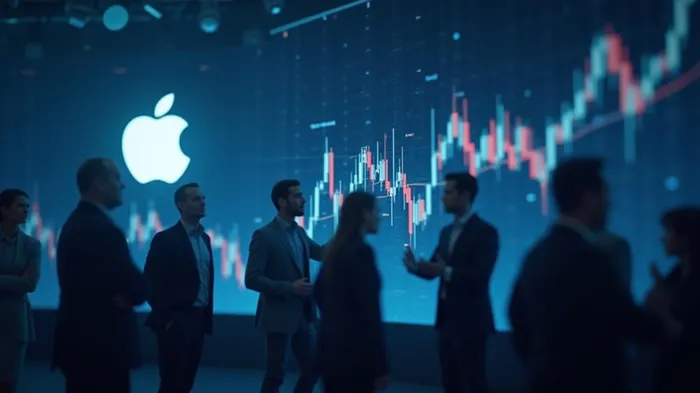Google's Digital Crossroads: How Apple's AI Move Shook the Tech Giants
The tech world has long been a duopoly, but this week, AlphabetGOOG-- (Google) faced a stark reminder of its vulnerability. On April 30, 2025, Alphabet’s shares plummeted 7.5%, erasing $150 billion in market value, after Apple’s senior executive revealed a seismic shift: for the first time, searches on Safari were declining as users flocked to AI-driven alternatives like Perplexity. The event underscores a pivotal moment for two giants entwined by billions in payments and decades of dominance.

The Trigger: Apple’s AI Gambit and the DOJ’s Crosshairs
The turmoil began in a U.S. courtroom, where Apple’s SVP Eddy Cue testified during the Justice Department’s antitrust case against Alphabet. Cue disclosed that Safari-based Google searches had fallen for the first time in April 2025, with users migrating to AI tools like ChatGPT and Perplexity. He also confirmed Apple is actively exploring integrating these AI engines into its browser—a direct challenge to Google’s $20 billion annual deal to remain the default search engine on iPhones.
The revelation sent shockwaves: Alphabet’s stock fell to $152.80, its worst single-day drop in years. Yet by Thursday, shares rebounded 2% as analysts downplayed the immediate threat. “Apple has incentives to highlight Google’s struggles to weaken the DOJ’s case,” noted JPMorgan’s Harlan Sur, pointing to the $20 billion payout Apple risks losing if regulators ban such deals.
The AI Arms Race and Regulatory Uncertainty
Behind the volatility lies a broader tech reckoning. Alphabet’s search engine, which generates 36% of its ad revenue from Safari users, faces dual pressures: AI’s rise and antitrust scrutiny. Google’s response? Emphasizing its own AI advancements, such as Gemini-powered “AI Overviews,” which now boast 1.5 billion monthly users globally. Analysts like John Blackledge (TD Cowen) argue these tools generate revenue comparable to traditional searches, countering fears of cannibalization.
Yet rivals are closing in. Microsoft’s Copilot and Apple’s integration of ChatGPT via Apple Intelligence signal a paradigm shift. “AI isn’t just a tool—it’s a new battlefield,” said one Wall Street strategist. The DOJ’s proposed remedies—banning Google’s default search payments—add to the uncertainty. If enforced, Alphabet would lose not only Apple’s lucrative deal but also the bargaining power to shape Safari’s future.
Analysts Split on Long-Term Risks
The rebound on Thursday reflected investor skepticism toward Apple’s urgency. Jefferies’ Brent Thill called the sell-off “overdone,” noting Apple’s financial dependence on the Google deal. Meanwhile, Google’s data—query growth across platforms, including Apple devices—bolstered confidence. “Their ecosystem dominance isn’t easily unraveled,” said Citi’s Mark May.
But the market remains skittish. Alphabet’s stock is down 20% year-to-date, while Apple’s modest gains highlight its strategic maneuvering. The stakes are existential: Alphabet’s 5-year growth of 120% relied on search’s stability, now tested by AI’s disruption.
Conclusion: A New Era for the Digital Giants
This week’s turbulence marks a turning point. Alphabet’s resilience hinges on its ability to monetize AI without sacrificing search’s ad base—a tightrope walk. Apple’s shift to AI-powered search isn’t just about competition; it’s a bid to diversify revenue and blunt antitrust scrutiny. Investors now face a choice: bet on Alphabet’s scale and innovation, or on Apple’s pivot to a post-Google world.
The coming months will be decisive. A DOJ ruling could redefine the terms of their partnership, while AI adoption rates will test whether Google’s core business can adapt. For now, the $150 billion valuation swing serves as a stark reminder: in tech, yesterday’s dominance is no guarantee of tomorrow’s relevance.
Greg Ip’s analysis highlights the intersection of regulatory risk and technological disruption, urging investors to weigh Alphabet’s entrenched advantages against the existential threats posed by AI and antitrust reforms.
Tracking the pulse of global finance, one headline at a time.
Latest Articles
Stay ahead of the market.
Get curated U.S. market news, insights and key dates delivered to your inbox.

Comments
No comments yet